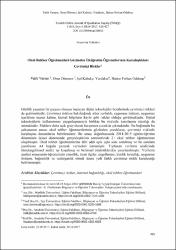| dc.contributor.author | Yaman, Fatih | |
| dc.contributor.author | Dönmez, Onur | |
| dc.contributor.author | Kabakçı, Işıl Yurdakul | |
| dc.contributor.author | Odabaşı, Hatice Ferhan | |
| dc.date.accessioned | 2019-10-18T19:03:15Z | |
| dc.date.available | 2019-10-18T19:03:15Z | |
| dc.date.issued | 2017 | |
| dc.identifier.uri | http://www.trdizin.gov.tr/publication/paper/detail/TWpRek56Z3lNZz09 | |
| dc.identifier.uri | https://hdl.handle.net/11421/11018 | |
| dc.description.abstract | Günlük yaşamın bir parçası olmaya başlayan dijital teknolojiler beraberinde çevrimiçi riskleri de getirmektedir. Çevrimiçi risklere bakıldığında siber zorbalık, uygunsuz iletişim, uygunsuz içeriklere maruz kalma, kişisel bilgilerin kaybı gibi riskler olduğu görülmektedir. Dijital teknolojilerin kullanımının yaygınlaşmasıyla birlikte bu risklerle karşılaşma olasılığı da artmaktadır. Risklere daha açık grup olarak karşımıza çocuklar çıkmaktadır. Bu bağlamda bu çalışmanın amacı okul rehber öğretmenlerinin gözünden çocukların, çevrimiçi risklerle karşılaşma durumlarını belirlemektir. Bu amaç doğrultusunda 2014-2015 eğitim-öğretim döneminin ikinci döneminde gerçekleştirilen seminerlerde 21 okul rehber öğretmenine ulaşılmıştır. Okul rehber öğretmenlerine dört adet açık uçlu soru sorulmuş ve bu sorulara yanıtlarını A4 kağıda yazarak vermeleri istenmiştir. Toplanan verilerin analizinde tümdengelimsel analiz işe koşulmuş ve betimsel istatistiklerden yararlanılmıştır. Verilerin analizi sonucunda öğrencilerin cinsellik, ticari ilgiler, engellenme, kimlik hırsızlığı, uygunsuz iletişim, bağımlılık ve saldırganlık olmak üzere yedi farklı çevrimiçi riskle karşılaştığı belirlenmiştir. | en_US |
| dc.description.abstract | Digital technologies bring about some online risks as they become a regular part of daily life. Online risks cover a range of threats such as cyberbullying, inappropriate communication, exposure to explicit content, and personal information theft. The individuals' chances to face with online risk increase as the digital technologies become widespread. Within the community, children are more vulnerable to online risks. In this context, the purpose of this study was to identify the children's state of facing online risks based on the perspectives of school counselor teachers. In doing so, the researchers contacted with 21 school counselor teachers during the seminar sessions of the 2014-2015 school year's second semester. The participating teachers answered four open-ended questions and handed in their answers in written form. The data then analyzed employing deductive analysis methods and descriptive statistics. The results indicated that the students were exposed to seven online risk groups titled sexuality, commercial interests, banning, identity theft, inappropriate communication, addiction, and violence. | en_US |
| dc.language.iso | tur | en_US |
| dc.rights | info:eu-repo/semantics/openAccess | en_US |
| dc.subject | Eğitim | en_US |
| dc.subject | Eğitim Araştırmaları | en_US |
| dc.title | Okul Rehber Öğretmenleri Gözünden İlköğretim Öğrencilerinin Karşılaştıkları
Çevrimiçi Riskler | en_US |
| dc.title.alternative | Primary School Students' Encounters Against Online Risks from the Perspectives of Schools Counselor Teachers | en_US |
| dc.type | article | en_US |
| dc.relation.journal | Turkish Online Journal of Qualitative Inquiry | en_US |
| dc.contributor.department | Anadolu Üniversitesi | en_US |
| dc.identifier.volume | 8 | en_US |
| dc.identifier.issue | 4 | en_US |
| dc.identifier.startpage | 415 | en_US |
| dc.identifier.endpage | 427 | en_US |
| dc.relation.publicationcategory | Makale - Ulusal Hakemli Dergi - Kurum Öğretim Elemanı | en_US |
| dc.contributor.institutionauthor | Odabaşı, Hatice Ferhan | |


















